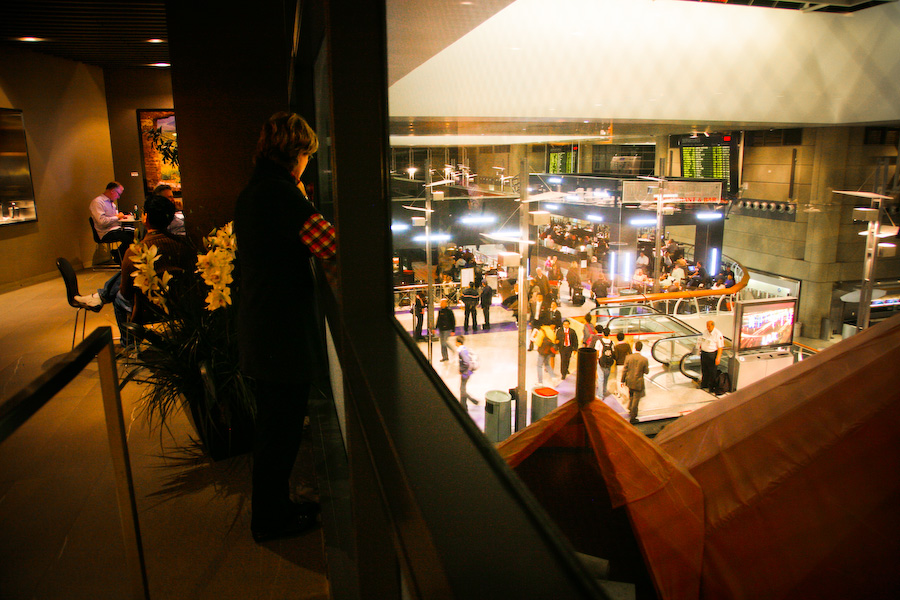
True nature
It was a bit like watching television, but hard to know who was watching who, or which side of the glass you were on, and whether maybe this was a case of the static becoming part of the signal.
I'm on my way to a conference, and the organizers booked me business class, so today I traded wheels for wings. The lounge is perched above the terminal like skybox seats at a ball game, and in the lounge everything is free, though getting to the lounge in the first place is not. Laptops light the faces of well-fed ballers and bankers who say things like "I'll hit six continents by June — you?" and, "Is Dewar's really the only scotch you've got?"
If they were to look down at the terminal, they would see the noisy messy masses rushing to their gates, and if the masses were to look up, they would see a world just out of reach, guarded by smiling receptionists who say, "Good evening sir, may I please see your boarding pass?" and if your boarding pass does not say "Business" or "First", they stop smiling and say, "I'm sorry, but the elevator is right behind you."
The window is reinforced with chicken wire in case the masses mutiny and start to climb the walls. There are big red tents over the food court, which provide a dramatic foreground as you look up at the lounge. This creates an aspirational dynamic, like peasants looking up at the castle, and I'm pretty sure they designed it that way. But the back of the tents are crumbling, and the whole thing is like a fragile facade that could collapse at any moment, built on borrowed debt and make-believe, just like the economy.
A couple of weeks ago I was at the airport in Salt Lake City, and went to get some Chinese food. The guy at the register was thin, brown-skinned, and probably very poor. I bet he was happy to have a job. He wore a brightly-colored uniform and a baseball hat that was too big for him. It looked silly and vaguely offensive, in the same way that a businessman wearing a Hopi headdress would look silly and offensive.
He smiled at me and meekly said, "Something to drink, sir, maybe a Pepsi?" I suddenly felt very sad for him and for me and for all of us, because I could tell he felt like he and I were very different, and that society had all sorts of metrics to prove it. I thought how he seemed like my sad forgotten brother, and how we had both got so caught up in our game of make-believe that we forgot we were family, and how the whole world was filled with people who forgot they were family, and how sad this was because the game we're all playing is some kind of lie.
This all seemed very tragic to me, but it seemed more or less tragic depending on how I thought about him and me, and how I thought about humans in general, and whether I thought about humans as basically tragic or basically banal.
When I thought about humans as basically banal, I pictured glorified apes standing on opposite sides of the register, sniffing each other and scratching where they itched, and one of them asking the other if he wanted some Pepsi. This kind of world didn't have much room for tragedy. Most situations, including this one, could be explained by some combination of natural selection and dumb luck. But this kind of world seemed like a lie, too, made by the same people who made the lounge.
Then instead of apes, I pictured two wandering souls who had forgotten their true nature, whose purpose was to remember and then to remind each other, so they could get back the thing they lost. When I thought about it this way, the social gulf between me and the guy at the register seemed incredibly tragic, and I wanted to tear off his baseball hat and tell him who we really were, but I thought that he probably wouldn't understand and he might even call security. I knew he had other things to think about, like how to feed his family, and maybe he wanted a big TV so he could watch ball games, and maybe someday, if he was very lucky, he would get to sit in a skybox, and that seemed saddest of all.
